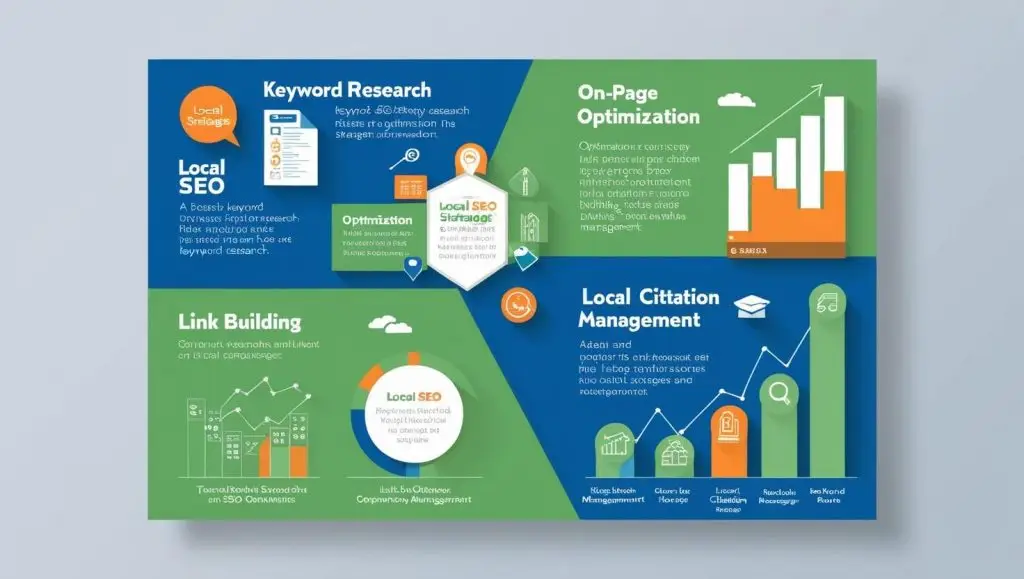Introduction
In today’s digital landscape, SEO for small businesses is (Search Engine Optimization) is essential to compete online. With Google’s ever-changing algorithms, staying ahead requires an updated strategy. In this guide, we’ll cover everything you need to know about SEO for small businesses in 2024, including best practices, trends, and actionable tips.
Why SEO Matters for Small Businesses
- Increases Online Visibility – Helps potential customers find your business on search engines.
- Drives Organic Traffic – Brings free, high-intent traffic to your website.
- Builds Credibility & Trust – Higher rankings establish authority in your niche.
- Enhances User Experience – SEO-friendly sites are faster, mobile-friendly, and easy to navigate.
- Cost-Effective Marketing – Unlike paid ads, SEO generates long-term benefits without ongoing costs.
1. Keyword Research: Finding the Right Keywords
Keyword research is the foundation of SEO. Here’s how to find the best keywords for your business:
Use Keyword Research Tools:
- Google Keyword Planner
- Ahrefs
- SEMrush
- Ubersuggest
Types of Keywords to Target:
- Short-Tail Keywords (e.g., “SEO services”) – High competition.
- Long-Tail Keywords (e.g., “best SEO services for small businesses”) – Easier to rank.
- Local Keywords (e.g., “SEO agency in New York”) – Targets nearby customers.
- Question-Based Keywords (e.g., “How does SEO help small businesses?”) – Great for blog content.
2. On-Page SEO: Optimizing Your Website
Optimizing your website ensures search engines understand your content and rank it effectively.
Essential On-Page SEO Practices:
- Title Tags & Meta Descriptions – Include primary keywords naturally.
- Header Tags (H1, H2, H3, etc.) – Structure content for readability.
- Internal Linking – Connect relevant pages to improve site navigation.
- Image Optimization – Use alt tags with keywords.
- Mobile-Friendliness – Ensure your site is responsive.
- Page Speed Optimization – Use tools like Google PageSpeed Insights.
3. Local SEO: Ranking in Your Area
For small businesses, Local SEO is crucial for attracting nearby customers.
Key Local SEO Strategies:
- Google My Business (GMB) Optimization – Keep your listing updated.
- NAP Consistency (Name, Address, Phone Number) – Ensure consistency across directories.
- Local Citations & Listings – Get listed on Yelp, Yellow Pages, and industry-specific directories.
- Customer Reviews & Ratings – Encourage satisfied clients to leave reviews on Google and other platforms.
- Local Content – Create blog posts targeting your local audience.
4. Technical SEO: Enhancing Website Performance
Technical SEO ensures your website is easy for search engines to crawl and index.
Technical SEO Best Practices:
- SSL Certificate (HTTPS) – Improves security.
- XML Sitemap – Helps search engines discover your pages.
- Robots.txt File – Guides search engines on which pages to crawl.
- Schema Markup – Enhances rich snippets in search results.
- Fix Broken Links – Avoids negative impact on rankings.
5. Off-Page SEO: Building Authority & Backlinks
Off-page SEO involves actions outside your website that influence rankings.
Effective Off-Page SEO Techniques:
- Backlink Building – Get high-quality links from reputable sites.
- Guest Blogging – Write for authoritative websites in your niche.
- Social Media Signals – Increase engagement on social platforms.
- Brand Mentions – Encourage others to mention your business.
- Influencer Outreach – Partner with industry influencers for credibility.
6. Content Marketing & Blogging for SEO
High-quality content attracts visitors and boosts rankings.
Types of Content to Publish:
- Blog posts (like this one!)
- How-to guides & tutorials
- Case studies & success stories
- Industry news & trends
- Infographics & videos
7. Trends of the SEO for Small Businesses
SEO is always evolving. Here are some key trends for 2024:
- AI & Machine Learning – Google’s AI-driven search continues to impact rankings.
- Voice Search Optimization – Optimize for natural, conversational queries.
- E-E-A-T (Experience, Expertise, Authority, Trustworthiness) – Focus on high-quality, trustworthy content.
- Core Web Vitals – Improve site speed, interactivity, and visual stability.
- Video SEO – Optimize video content for search engines.
Conclusion: Take Action Today!
SEO is an ongoing process, but implementing these strategies will help your small business rank higher, attract more traffic, and generate more leads. Stay updated with SEO trends, monitor your website performance, and continuously optimize. SEO for small business.
Need Help with SEO?
If you want to boost your small business’s online presence, contact Rauniyar Tech Park for a free consultation!
For more blogs : Click here


